Elvis Presley (1935-1977)
 Elvis Presley was an American singer and actor. Regarded as one of the most significant cultural icons of the 20th century, he is often referred to as the “King of Rock and Roll” or simply “the King”.
Elvis Presley was an American singer and actor. Regarded as one of the most significant cultural icons of the 20th century, he is often referred to as the “King of Rock and Roll” or simply “the King”.
Presley was born in Tupelo, Mississippi, and relocated to Memphis, Tennessee with his family when he was 13 years old. His music career began there in 1954, when he recorded a song with producer Sam Phillips at Sun Records. Accompanied by guitarist Scotty Moore and bassist Bill Black, Presley was an early popularizer of rockabilly, an uptempo, backbeat-driven fusion of country music and rhythm and blues. RCA Victor acquired his contract in a deal arranged by Colonel Tom Parker, who managed the singer for more than two decades. Presley’s first RCA single, “Heartbreak Hotel”, was released in January 1956 and became a number-one hit in the United States. He was regarded as the leading figure of rock and roll after a series of successful network television appearances and chart-topping records. His energized interpretations of songs and sexually provocative performance style, combined with a singularly potent mix of influences across color lines that coincided with the dawn of the Civil Rights Movement, made him enormously popular—and controversial.
In November 1956, Presley made his film debut in Love Me Tender. In 1958, he was drafted into military service. He resumed his recording career two years later, producing some of his most commercially successful work before devoting much of the 1960s to making Hollywood films and their accompanying soundtrack albums, most of which were critically derided. In 1968, following a seven-year break from live performances, he returned to the stage in the acclaimed televised comeback special Elvis, which led to an extended Las Vegas concert residency and a string of highly profitable tours. In 1973, Presley featured in the first globally broadcast concert via satellite, Aloha from Hawaii. On August 16, 1977, he suffered a heart attack in his Graceland estate, and died as a result. His death came in the wake of many years of prescription drug abuse.
Presley is one of the most celebrated and influential musicians of the 20th century. Commercially successful in many genres, including pop, blues and gospel, he is one of the best-selling solo artists in the history of recorded music, with estimated record sales of around 600 million units worldwide.[5] He won three Grammys,[6] also receiving the Grammy Lifetime Achievement Award at age 36, and has been inducted into multiple music halls of fame.
John Lennon (1940-1980)
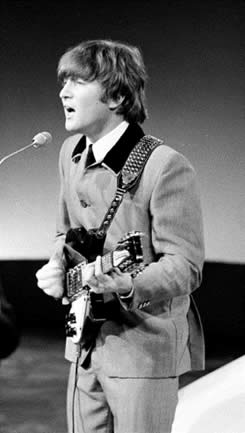 Was an English singer, songwriter, musician, and activist who co-founded the Beatles, the most commercially successful and musically influential band in the history of popular music. He and fellow member Paul McCartney formed a much-celebrated songwriting partnership.
Was an English singer, songwriter, musician, and activist who co-founded the Beatles, the most commercially successful and musically influential band in the history of popular music. He and fellow member Paul McCartney formed a much-celebrated songwriting partnership.
Born and raised in Liverpool, Lennon became involved in the skiffle craze as a teenager; his first band, the Quarrymen, was named the Silver Beatles, and finally evolved into the Beatles in 1960. When the group disbanded in 1970, Lennon embarked on a sporadic solo career that produced albums including John Lennon/Plastic Ono Band and Imagine, and songs such as Give Peace a Chance, Working Class Hero, and Imagine. After he married Yoko Ono in 1969, he added “Ono” as one of his middle names. Lennon disengaged himself from the music business in 1975 to raise his infant son Sean, but re-emerged with Ono in 1980 with the new album Double Fantasy. He was shot and killed in front of his home in New York City three weeks after its release.
Lennon revealed a rebellious nature and acerbic wit in his music, writing, drawings, on film and in interviews. Controversial through his political and peace activism, he moved from London to Manhattan in 1971, where his criticism of the Vietnam War resulted in a lengthy attempt by Richard Nixon’s administration to deport him. Some of his songs were adopted as anthems by the anti-war movement and the larger counterculture.
By 2012 (thirty-two years after his death), Lennon’s solo album sales in the United States had exceeded 14 million units. He is responsible for 25 number-one singles on the US Hot 100 chart as a writer, co-writer, or performer.
Jimi Hendrix (1942-1970)
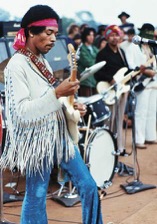 Was an American rock guitarist, singer, and songwriter. Although his mainstream career spanned only four years, he is widely regarded as one of the most influential electric guitarists in the history of popular music, and one of the most celebrated musicians of the 20th century. The Rock and Roll Hall of Fame describes him as “arguably the greatest instrumentalist in the history of rock music”.
Was an American rock guitarist, singer, and songwriter. Although his mainstream career spanned only four years, he is widely regarded as one of the most influential electric guitarists in the history of popular music, and one of the most celebrated musicians of the 20th century. The Rock and Roll Hall of Fame describes him as “arguably the greatest instrumentalist in the history of rock music”.
Born in Seattle, Washington, Hendrix began playing guitar at the age of 15. In 1961, he enlisted in the U.S. Army and trained as a paratrooper in the 101st Airborne Division; he was granted an honorable discharge the following year. Soon afterward, he moved to Clarksville, Tennessee, and began playing gigs on the Chitlin’ Circuit, earning a place in the Isley Brothers’ backing band and later with Little Richard, with whom he continued to work through mid-1965. He then played with Curtis Knight and the Squires before moving to England in late 1966 after being discovered by Linda Keith, who in turn interested bassist Chas Chandler of the Animals in becoming his first manager.
Within months, Hendrix had earned three UK top ten hits with the Jimi Hendrix Experience: “Hey Joe”, “Purple Haze”, and “The Wind Cries Mary”. He achieved fame in the U.S. after his performance at the Monterey Pop Festival in 1967, and in 1968 his third and final studio album, Electric Ladyland, reached number one in the U.S.; it was Hendrix’s most commercially successful release and his first and only number one album. The world’s highest-paid performer, he headlined the Woodstock Festival in 1969 and the Isle of Wight Festival in 1970 before his accidental death from barbiturate-related asphyxia on September 18, 1970, at the age of 27.
Hendrix was inspired musically by American rock and roll and electric blues. He favored overdriven amplifiers with high volume and gain, and was instrumental in utilizing the previously undesirable sounds caused by guitar amplifier feedback. He helped to popularize the use of a wah-wah pedal in mainstream rock, and was the first artist to use stereophonic phasing effects in music recordings. Holly George-Warren of Rolling Stone commented: “Hendrix pioneered the use of the instrument as an electronic sound source. Players before him had experimented with feedback and distortion, but Hendrix turned those effects and others into a controlled, fluid vocabulary every bit as personal as the blues with which he began.”
Janis Joplin (1943-1970)
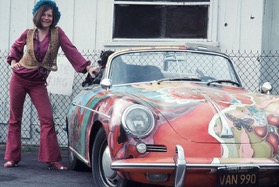 Janis Joplin was an American rock singer and songwriter. She was one of the biggest female rock stars of her era. After releasing three albums, she died of a heroin overdose at age 27. A fourth album, Pearl, was released in January 1971, just over three months after her death. It reached number one on the Billboard charts.
Janis Joplin was an American rock singer and songwriter. She was one of the biggest female rock stars of her era. After releasing three albums, she died of a heroin overdose at age 27. A fourth album, Pearl, was released in January 1971, just over three months after her death. It reached number one on the Billboard charts.
In 1967, Joplin rose to fame during an appearance at Monterey Pop Festival, where she was the lead singer of the then little-known San Francisco psychedelic rock band Big Brother and the Holding Company. After releasing two albums with the band, she left Big Brother to continue as a solo artist with her own backing groups, first the Kozmic Blues Band and then the Full Tilt Boogie Band. She appeared at the Woodstock festival and the Festival Express train tour. Five singles by Joplin went into the Billboard Top 100, including a cover of the song “Me and Bobby McGee”, which reached number 1 in March 1971. Her most popular songs include her cover versions of “Piece of My Heart”, “Cry Baby”, “Down on Me”, “Ball ‘n’ Chain”, and “Summertime”; and her original song “Mercedes Benz”, her final recording.
Joplin, highly respected for her charismatic performing ability, was posthumously inducted into the Rock and Roll Hall of Fame in 1995.
Jim Morrison (1943-1971)
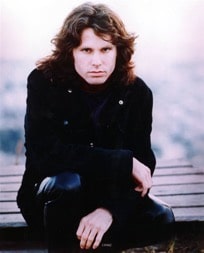 Jim Morrison was an American singer, songwriter, and poet, best remembered as the lead singer of the Doors. Due to his poetic lyrics, distinctive voice, wild personality, performances, and the dramatic circumstances surrounding his life and early death, Morrison is regarded by both music critics and fans as one of the most iconic and influential frontmen in rock music history.
Jim Morrison was an American singer, songwriter, and poet, best remembered as the lead singer of the Doors. Due to his poetic lyrics, distinctive voice, wild personality, performances, and the dramatic circumstances surrounding his life and early death, Morrison is regarded by both music critics and fans as one of the most iconic and influential frontmen in rock music history.
Morrison co-founded the Doors during the summer of 1965 in Venice, California. The band spent two years in obscurity until shooting to prominence with their #1 single in the United States, “Light My Fire”, taken from their self-titled debut album. Morrison recorded a total of six studio albums with the Doors, all of which sold well and received critical acclaim. Though the Doors recorded two more albums after his death, the loss of Morrison was crippling to the band, and they disbanded in 1973. In 1993, Morrison, as a member of the Doors, was inducted into the Rock and Roll Hall of Fame.
Since his death, his fame has endured as one of popular culture’s most rebellious and oft-displayed icons, representing the generation gap and youth counterculture. He was also well known for improvising spoken word poetry passages while the band played live. Was known as The Lizard King.
Buddy Holly (1936-1959)
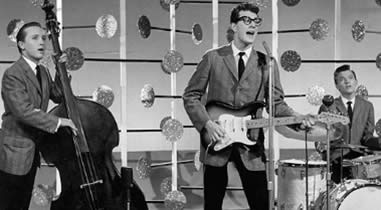 Buddy Holly was an American musician and singer-songwriter who was a central figure of mid-1950s rock and roll. He was born in Lubbock, Texas, to a musical family during the Great Depression, and learned to play guitar and sing alongside his siblings. His style was influenced by gospel music, country music, and rhythm and blues acts, and he performed in Lubbock with his friends from high school. He made his first appearance on local television in 1952, and the following year he formed the group “Buddy and Bob” with his friend Bob Montgomery. In 1955, after opening for Elvis Presley, he decided to pursue a career in music. He opened for Presley three times that year; his band’s style shifted from country and western to entirely rock and roll. In October that year, when he opened for Bill Haley & His Comets, he was spotted by Nashville scout Eddie Crandall, who helped him get a contract with Decca Records.
Buddy Holly was an American musician and singer-songwriter who was a central figure of mid-1950s rock and roll. He was born in Lubbock, Texas, to a musical family during the Great Depression, and learned to play guitar and sing alongside his siblings. His style was influenced by gospel music, country music, and rhythm and blues acts, and he performed in Lubbock with his friends from high school. He made his first appearance on local television in 1952, and the following year he formed the group “Buddy and Bob” with his friend Bob Montgomery. In 1955, after opening for Elvis Presley, he decided to pursue a career in music. He opened for Presley three times that year; his band’s style shifted from country and western to entirely rock and roll. In October that year, when he opened for Bill Haley & His Comets, he was spotted by Nashville scout Eddie Crandall, who helped him get a contract with Decca Records.
Holly’s recording sessions at Decca were produced by Owen Bradley. Unhappy with Bradley’s control in the studio and with the sound he achieved there, he went to producer Norman Petty in Clovis, New Mexico, and recorded a demo of “That’ll Be the Day”, among other songs. Petty became the band’s manager and sent the demo to Brunswick Records, which released it as a single credited to “The Crickets”, which became the name of Holly’s band. In September 1957, as the band toured, “That’ll Be the Day” topped the US “Best Sellers in Stores” chart and the UK Singles Chart. Its success was followed in October by another major hit, “Peggy Sue”.
The album Chirping Crickets, released in November 1957, reached number five on the UK Albums Chart. Holly made his second appearance on The Ed Sullivan Show in January 1958 and soon after, toured Australia and then the UK. In early 1959, he assembled a new band, consisting of future country music star Waylon Jennings (bass), famed session musician Tommy Allsup (guitar), and Carl Bunch (drums), and embarked on a tour of the midwestern U.S. After a show in Clear Lake, Iowa, he chartered an airplane to travel to his next show, in Moorhead, Minnesota. Soon after takeoff, the plane crashed, killing him, Ritchie Valens, The Big Bopper, and pilot Roger Peterson in a tragedy later referred to by Don McLean as “The Day the Music Died”.
During his short career, Holly wrote, recorded, and produced his own material. He is often regarded as the artist who defined the traditional rock-and-roll lineup of two guitars, bass, and drums. He was a major influence on later popular music artists, including Bob Dylan, The Beatles, The Rolling Stones, Eric Clapton, and Elton John. He was among the first artists inducted into the Rock and Roll Hall of Fame, in 1986. Rolling Stone magazine ranked him number 13 in its list of “100 Greatest Artists”.
Cass Elliot (1941-1974)
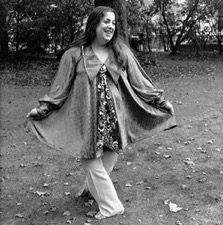 Also known as Mama Cass, was an American singer and actress, best known as a member of the Mamas & the Papas. After the group broke up, she released five solo albums. In 1998, Elliot, John Phillips, Denny Doherty, and Michelle Phillips were inducted into the Rock and Roll Hall of Fame for their work as the Mamas & the Papas.
Also known as Mama Cass, was an American singer and actress, best known as a member of the Mamas & the Papas. After the group broke up, she released five solo albums. In 1998, Elliot, John Phillips, Denny Doherty, and Michelle Phillips were inducted into the Rock and Roll Hall of Fame for their work as the Mamas & the Papas.
After leaving high school to pursue an entertainment career in New York, Elliot toured in the musical The Music Man but lost the part of Miss Marmelstein in I Can Get It for You Wholesale to Barbra Streisand in 1962. Elliot would sometimes sing while working as a cloakroom attendant at The Showplace in Greenwich Village, but she did not pursue a singing career until she moved to the Washington, D.C. area to attend American University (not Swarthmore College, as mentioned in the biographical song “Creeque Alley”).
America’s folk music scene was on the rise when Elliot met banjoist and singer Tim Rose and singer John Brown, and the three began performing as the Triumvirate. In 1963, James Hendricks replaced Brown, and the trio was renamed the Big 3. Elliot’s first recording with the Big 3 was “Winkin’, Blinkin’ and Nod”, released by FM Records in 1963. In 1964, the group appeared on an “open mic” night at The Bitter End in Greenwich Village, billed as “Cass Elliot and the Big 3”, followed onstage by folk singer Jim Fosso and bluegrass banjoist Eric Weissberg (who became famous eight years later for performing “Dueling Banjos” on the soundtrack for Deliverance (1972)).
Tim Rose left the Big 3 in 1964, and Elliot and Hendricks teamed with Canadians Zal Yanovsky and Denny Doherty to form the Mugwumps. This group lasted eight months, after which Cass performed as a solo act for a while. In the meantime, Yanovsky and John Sebastian co-founded the Lovin’ Spoonful, while Doherty joined the New Journeymen, a group that also included John Phillips and his wife Michelle. In 1965, Doherty persuaded Phillips that Elliot should join the group, which she did while she and the group members were vacationing in the Virgin Islands.
Doherty also said that the occasion marked the beginning of his affair with Michelle Phillips. Elliot was in love with Doherty and was displeased when he told her of the affair. Doherty has said that Elliot once proposed to him, but that he was so stoned at the time that he could not even respond.
Elliot was known for her sense of humor and optimism, and was considered by some to be the most charismatic member of the group. Her powerful, distinctive voice was a major factor in their success. She is best remembered for her vocals on the group’s hits “California Dreamin'”, “Monday, Monday”, “Words of Love”, and the solo “Dream a Little Dream of Me”, which the group recorded in 1968 after learning about the death of Fabian Andre, one of the men who co-wrote it, whom Michelle Phillips had met years earlier. Elliot’s version is noteworthy for its contemplative pace, whereas almost all earlier recordings of “Dream a Little Dream of Me” (including one by Nat King Cole and another by Ozzie Nelson) had been up-tempo versions—the song having been written in 1931 as a dance tune.
The Mamas & the Papas continued to record to meet the terms of their record contract. Their final album was released in 1971.
Bobby Darin (1936-1973)
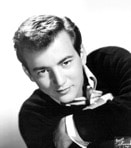 Bobby Darin was an American singer, songwriter, multi-instrumentalist, and actor in film and television. He performed jazz, pop, rock and roll, folk, swing, and country music.
Bobby Darin was an American singer, songwriter, multi-instrumentalist, and actor in film and television. He performed jazz, pop, rock and roll, folk, swing, and country music.
He started his career as a songwriter for Connie Francis. He recorded his first million-selling single, “Splish Splash”, in 1958. This was followed by “Dream Lover”, “Mack the Knife”, and “Beyond the Sea”, which brought him worldwide fame. In 1962 he won a Golden Globe Award for his first film, Come September, co-starring his first wife, Sandra Dee.
During the 1960s he became more politically active and worked on Robert F. Kennedy’s Democratic presidential campaign. He was present on the night of June 4/5, 1968, at the Ambassador Hotel in Los Angeles at the time of Kennedy’s assassination. During the same year, he discovered he had been raised by his grandmother, not his mother, and that the girl he thought was his sister was actually his mother. These events deeply affected Darin and sent him into a long period of seclusion.
Although he made a successful comeback (in television) his health was beginning to fail, as he had always expected following bouts of rheumatic fever in childhood. This knowledge of his vulnerability had always spurred him on to use his musical talent while still young. He died at the age of 37 following a heart operation in Los Angeles.
Marvin Gaye (1939-1984)
 Marvin Gaye was an American singer, songwriter and record producer. Gaye helped to shape the sound of Motown in the 1960s, first as an in-house session player and later as a solo artist with a string of hits, including “Ain’t That Peculiar”, “How Sweet It Is (To Be Loved By You)” and “I Heard It Through the Grapevine”, and duet recordings with Mary Wells, Kim Weston, Diana Ross and Tammi Terrell, later earning the titles “Prince of Motown” and “Prince of Soul”.
Marvin Gaye was an American singer, songwriter and record producer. Gaye helped to shape the sound of Motown in the 1960s, first as an in-house session player and later as a solo artist with a string of hits, including “Ain’t That Peculiar”, “How Sweet It Is (To Be Loved By You)” and “I Heard It Through the Grapevine”, and duet recordings with Mary Wells, Kim Weston, Diana Ross and Tammi Terrell, later earning the titles “Prince of Motown” and “Prince of Soul”.
During the 1970s, he recorded the concept albums What’s Going On and Let’s Get It On and became one of the first artists in Motown (joint with Stevie Wonder) to break away from the reins of a production company.
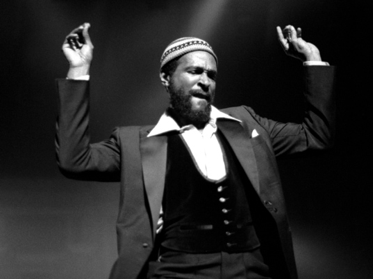 Gaye’s later recordings influenced several contemporary R&B subgenres, such as quiet storm and neo soul.[3] Following a period in Europe as a tax exile in the early 1980s, Gaye released the 1982 Grammy Award-winning hit “Sexual Healing” and its parent album Midnight Love.
Gaye’s later recordings influenced several contemporary R&B subgenres, such as quiet storm and neo soul.[3] Following a period in Europe as a tax exile in the early 1980s, Gaye released the 1982 Grammy Award-winning hit “Sexual Healing” and its parent album Midnight Love.
On April 1, 1984, Gaye’s father, Marvin Gay Sr., fatally shot him at their house in the West Adams district of Los Angeles.[4][5] Since his death, many institutions have posthumously bestowed Gaye with awards and other honors—including the Grammy Lifetime Achievement Award, the Rhythm and Blues Music Hall of Fame, the Songwriters Hall of Fame and the Rock and Roll Hall of Fame.
Otis Redding (1942-1967)
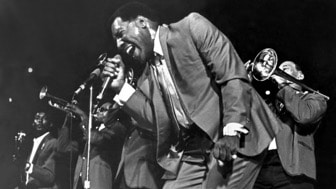 Otis Redding was an American singer, songwriter, record producer, arranger, and talent scout. He is considered one of the greatest singers in the history of American popular music and a seminal artist in soul music and rhythm and blues. Redding’s style of singing gained inspiration from the gospel music that preceded the genre. His singing style influenced many other soul artists of the 1960s, such as James Carr and Freddie Jackson. (Woodstra and Elewine) During his lifetime, his recordings were produced by Stax Records, based in Memphis, Tennessee.
Otis Redding was an American singer, songwriter, record producer, arranger, and talent scout. He is considered one of the greatest singers in the history of American popular music and a seminal artist in soul music and rhythm and blues. Redding’s style of singing gained inspiration from the gospel music that preceded the genre. His singing style influenced many other soul artists of the 1960s, such as James Carr and Freddie Jackson. (Woodstra and Elewine) During his lifetime, his recordings were produced by Stax Records, based in Memphis, Tennessee.
Born and raised in the US state of Georgia, Redding quit school at age 15 to support his family, working with Little Richard’s backing band, the Upsetters, and performing at talent shows for prize money. In 1958, he joined Johnny Jenkins’s band, the Pinetoppers, with whom he toured the Southern states as a singer and driver. An unscheduled appearance on a Stax recording session led to a contract and his first single, “These Arms of Mine”, in 1962.
Stax released Redding’s debut album, Pain in My Heart, two years later. Initially popular mainly with African-Americans, Redding later reached a wider American pop music audience. Along with his group, he first played small gigs in the American South. He later performed at the popular Los Angeles night club Whisky a Go Go and toured Europe, performing in London, Paris and other major cities. He also performed at the Monterey Pop Festival in 1967.
Shortly before his death in a plane crash, Redding wrote and recorded his iconic “(Sittin’ On) The Dock of the Bay” with Steve Cropper. The song became the first posthumous number-one record on both the Billboard Hot 100 and R&B charts. The album The Dock of the Bay was the first posthumous album to reach number one on the UK Albums Chart. Redding’s premature death devastated Stax. Already on the verge of bankruptcy, the label soon discovered that Atlantic Records owned the rights to his entire song catalog.
Redding received many posthumous accolades, including the Grammy Lifetime Achievement Award and induction into the Rock and Roll Hall of Fame and the Songwriters Hall of Fame. In addition to “(Sittin’ On) The Dock of the Bay,” “Respect” and “Try a Little Tenderness” are among his best-known songs.
Karen Carpenter (1950-1983)
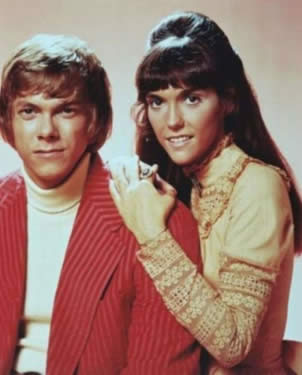 Karen Carpenter was an American singer and drummer. She and her brother Richard Carpenter formed the 1970s duo the Carpenters.
Karen Carpenter was an American singer and drummer. She and her brother Richard Carpenter formed the 1970s duo the Carpenters.
Her skills as a drummer earned admiration from drumming luminaries and peers, but she is best known for her vocal performances. She typically sang in a contralto vocal range.
Carpenter suffered from the eating disorder anorexia nervosa, which was little known at the time. She died at age 32 from heart failure caused by complications related to her illness.
Carpenter’s death led to increased visibility and awareness of eating disorders.
John Denver (1943-1997)
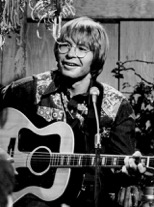 John Denver was an American singer-songwriter, record producer, actor, activist, and humanitarian, whose greatest commercial success was as a solo singer. After traveling and living in numerous locations while growing up in his military family, Denver began his music career with folk music groups during the late 1960s. Starting in the 1970s, he was one of the most popular acoustic artists of the decade and one of its best-selling artists.[4] By 1974, he was firmly established as America’s best-selling performer, and AllMusic has described Denver as “among the most beloved entertainers of his era”.
John Denver was an American singer-songwriter, record producer, actor, activist, and humanitarian, whose greatest commercial success was as a solo singer. After traveling and living in numerous locations while growing up in his military family, Denver began his music career with folk music groups during the late 1960s. Starting in the 1970s, he was one of the most popular acoustic artists of the decade and one of its best-selling artists.[4] By 1974, he was firmly established as America’s best-selling performer, and AllMusic has described Denver as “among the most beloved entertainers of his era”.
Denver recorded and released approximately 300 songs, about 200 of which he composed, with total sales of over 33 million records worldwide. He recorded and performed primarily with an acoustic guitar and sang about his joy in nature, his disdain for city life, his enthusiasm for music, and his relationship trials. Denver’s music appeared on a variety of charts, including country music, the Billboard Hot 100, and adult contemporary, in all earning him twelve gold and four platinum albums with his signature songs “Take Me Home, Country Roads”, “Annie’s Song”, “Rocky Mountain High”, “Thank God I’m a Country Boy”, and “Sunshine on My Shoulders”.
Denver appeared in several films and television specials during the 1970s and 1980s. He continued to record in the 1990s, also focusing on environmental issues by lending vocal support to space exploration and testifying in front of Congress in protest against censorship in music. He lived in Aspen, Colorado for much of his life and was known for his love of Colorado which he sang about numerous times. In 1974 Denver was named poet laureate of the state. The Colorado state legislature also adopted “Rocky Mountain High” as one of its two state songs in 2007.
Denver, who was an avid pilot, died at the age of 53 flying his personal experimental canard aircraft in a single-fatality crash.
Andy Gibb (1958-1988)
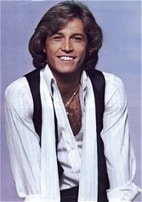 Andy Gibb Was a British singer, songwriter, performer, and teen idol. He was the youngest brother of the Bee Gees: Barry, Robin, and Maurice Gibb.
Andy Gibb Was a British singer, songwriter, performer, and teen idol. He was the youngest brother of the Bee Gees: Barry, Robin, and Maurice Gibb.
Gibb came to international prominence in the late 1970s with six singles that reached the Top 10 in the United States starting with “I Just Want to Be Your Everything” (1977), as well as three other top 20 singles.
Gibb’s success was brief, as he battled drug addiction and depression and died just five days after turning 30.
Sam Cooke (1931-1964)
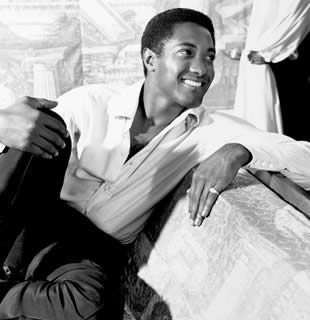 Sam Cooke was an American singer, songwriter, and entrepreneur.
Sam Cooke was an American singer, songwriter, and entrepreneur.
Influential as both a singer and composer, he is commonly known as the King of Soul for his distinctive vocals and importance within popular music. He began singing as a child and joined The Soul Stirrers before moving to a solo career where he scored a string of hit songs like “You Send Me”, “Wonderful World”, “Chain Gang”, and “Twistin’ the Night Away”.
His pioneering contributions to soul music contributed to the rise of Aretha Franklin, Bobby Womack, Al Green, Curtis Mayfield, Stevie Wonder, Marvin Gaye, and Billy Preston, and popularized the likes of Otis Redding and James Brown. AllMusic biographer Bruce Eder wrote that Cooke was “the inventor of soul music”, and possessed “an incredible natural singing voice and a smooth, effortless delivery that has never been surpassed”.
On December 11, 1964, at the age of 33, Cooke was shot and killed by Bertha Franklin, the manager of the Hacienda Motel in Los Angeles, California. After an inquest, the courts ruled Cooke’s death to be a justifiable homicide. Since that time, the circumstances of his death have been called into question by Cooke’s family.
Patsy Cline (1932-1963)
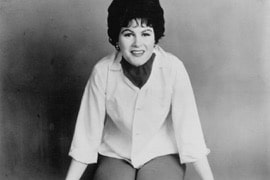 Patsy Cline was an American country music singer. Part of the late 1950s/early 1960s Nashville sound, Cline successfully “crossed over” to pop music and was one of the most influential, successful and acclaimed vocalists of the 20th century. She died at the age of 30 in a multiple-fatality crash of the private plane of her manager, Randy Hughes.
Patsy Cline was an American country music singer. Part of the late 1950s/early 1960s Nashville sound, Cline successfully “crossed over” to pop music and was one of the most influential, successful and acclaimed vocalists of the 20th century. She died at the age of 30 in a multiple-fatality crash of the private plane of her manager, Randy Hughes.
Cline was known for her rich tone, emotionally expressive and bold contralto voice, and her role as a country music industry pioneer. Along with Kitty Wells, she helped pave the way for women as headline performers in the genre. She overcame poverty, an unsuccessful marriage, a devastating automobile accident, and significant professional obstacles, and has been cited as an inspiration by Reba McEntire, LeAnn Rimes, and other singers in diverse styles. Books, movies, documentaries, articles and stage plays document her life and career.
Her hits began in 1957 with Donn Hecht’s and Alan Block’s “Walkin’ After Midnight,” Hank Cochran’s and Harlan Howard’s “I Fall to Pieces,” Hank Cochran’s “She’s Got You,” Willie Nelson’s “Crazy” and ended in 1963 with Don Gibson’s “Sweet Dreams.”
Millions of her records have sold since her death. She won awards and accolades, causing many to view her as an icon at the level of Jim Reeves, Johnny Cash and Elvis Presley. In 1973, ten years after her death, she became the first female solo artist inducted into the Country Music Hall of Fame.
Freddie Mercury (1946-1991)
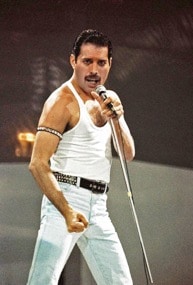 Freddie Mercury was a British singer, songwriter and record producer, known as the lead vocalist of the rock band Queen. He was known for his flamboyant stage persona and four-octave vocal range. Mercury wrote numerous hits for Queen, including “Bohemian Rhapsody”, “Killer Queen”, “Somebody to Love”, “Don’t Stop Me Now”, “Crazy Little Thing Called Love”, and “We Are the Champions”.
Freddie Mercury was a British singer, songwriter and record producer, known as the lead vocalist of the rock band Queen. He was known for his flamboyant stage persona and four-octave vocal range. Mercury wrote numerous hits for Queen, including “Bohemian Rhapsody”, “Killer Queen”, “Somebody to Love”, “Don’t Stop Me Now”, “Crazy Little Thing Called Love”, and “We Are the Champions”.
He led a solo career while performing with Queen, and occasionally served as a producer and guest musician for other artists.
Mercury was born of Parsi descent in the Sultanate of Zanzibar, and grew up there and in India before moving with his family to Middlesex, England, in his teens. He formed Queen in 1970 with guitarist Brian May and drummer Roger Taylor. Mercury died in 1991 at age 45 due to complications from AIDS, having confirmed the day before his death that he had contracted the disease.
Michael Jackson (1958-2009)
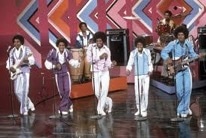 Michael Jackson Was an American singer, songwriter, actor, and dancer. Dubbed the “King of Pop”, he was one of the most popular entertainers in the world, and was the best-selling music artist at the time of his death. Jackson’s contributions to music, dance, and fashion along with his publicized personal life made him a global figure in popular culture for over four decades. The eighth child of the Jackson family, Michael made his professional debut in 1964 with his elder brothers Jackie, Tito, Jermaine, and Marlon as a member of the Jackson 5. He began his solo career in 1971 while at Motown Records. In the early 1980s, Jackson became a dominant figure in popular music.
Michael Jackson Was an American singer, songwriter, actor, and dancer. Dubbed the “King of Pop”, he was one of the most popular entertainers in the world, and was the best-selling music artist at the time of his death. Jackson’s contributions to music, dance, and fashion along with his publicized personal life made him a global figure in popular culture for over four decades. The eighth child of the Jackson family, Michael made his professional debut in 1964 with his elder brothers Jackie, Tito, Jermaine, and Marlon as a member of the Jackson 5. He began his solo career in 1971 while at Motown Records. In the early 1980s, Jackson became a dominant figure in popular music.
His music videos, including those of “Beat It”, “Billie Jean”, and “Thriller” from his 1982 album Thriller, are credited with breaking racial barriers and transforming the medium into an art form and promotional tool. The popularity of these videos helped bring the television channel MTV to fame. Jackson’s 1987 album Bad spawned the U.S. Billboard Hot 100 number-one singles “I Just Can’t Stop Loving You”, “Bad”, “The Way You Make Me Feel”, “Man in the Mirror”, and “Dirty Diana”, becoming the first album to have five number-one singles in the nation. He continued to innovate with videos such as “Black or White” and “Scream” throughout the 1990s, and forged a reputation as a touring solo artist. Through stage and video performances, Jackson popularized a number of complicated dance techniques, such as the robot and the moonwalk, to which he gave the name. His distinctive sound and style has influenced numerous artists of various music genres.
 Thriller is the best-selling album of all time, with estimated sales of 65 million copies worldwide. Jackson’s other albums, including Off the Wall (1979), Bad (1987), Dangerous (1991), and HIStory (1995), also rank among the world’s best-selling albums. He is one of the few artists to have been inducted into the Rock and Roll Hall of Fame twice, and was also inducted into the Songwriters Hall of Fame and the Dance Hall of Fame as the only dancer from pop and rock music.
Thriller is the best-selling album of all time, with estimated sales of 65 million copies worldwide. Jackson’s other albums, including Off the Wall (1979), Bad (1987), Dangerous (1991), and HIStory (1995), also rank among the world’s best-selling albums. He is one of the few artists to have been inducted into the Rock and Roll Hall of Fame twice, and was also inducted into the Songwriters Hall of Fame and the Dance Hall of Fame as the only dancer from pop and rock music.
His other achievements include multiple Guinness World Records including the Most Successful Entertainer of All Time, 13 Grammy Awards, the Grammy Legend Award, the Grammy Lifetime Achievement Award, 26 American Music Awards—more than any other artist—including the “Artist of the Century” and “Artist of the 1980s”, 13 number-one singles in the United States during his solo career—more than any other male artist in the Hot 100 era—and estimated sales of over 350 million records worldwide. Jackson won hundreds of awards, making him the most awarded recording artist in the history of popular music. He became the first artist in history to have a top ten single in the Billboard Hot 100 in five different decades when “Love Never Felt So Good” reached number nine on May 21, 2014. Jackson traveled the world attending events honoring his humanitarianism, and, in 2000, the Guinness World Records recognized him for supporting 39 charities, more than any other entertainer.
Aspects of Jackson’s personal life, including his changing appearance, personal relationships, and behavior, generated controversy. In 1993, he was accused of child sexual abuse, but the civil case was settled out of court for an undisclosed amount and no formal charges were brought. In 2005, he was tried and acquitted of further child sexual abuse allegations and several other charges after the jury found him not guilty on all counts. While preparing for his comeback concert series, This Is It, Jackson died of acute propofol and benzodiazepine intoxication on June 25, 2009, after suffering from cardiac arrest. The Los Angeles County Coroner ruled his death a homicide, and his personal physician, Conrad Murray, was convicted of involuntary manslaughter. Jackson’s death triggered a global outpouring of grief, and a live broadcast of his public memorial service was viewed around the world.
